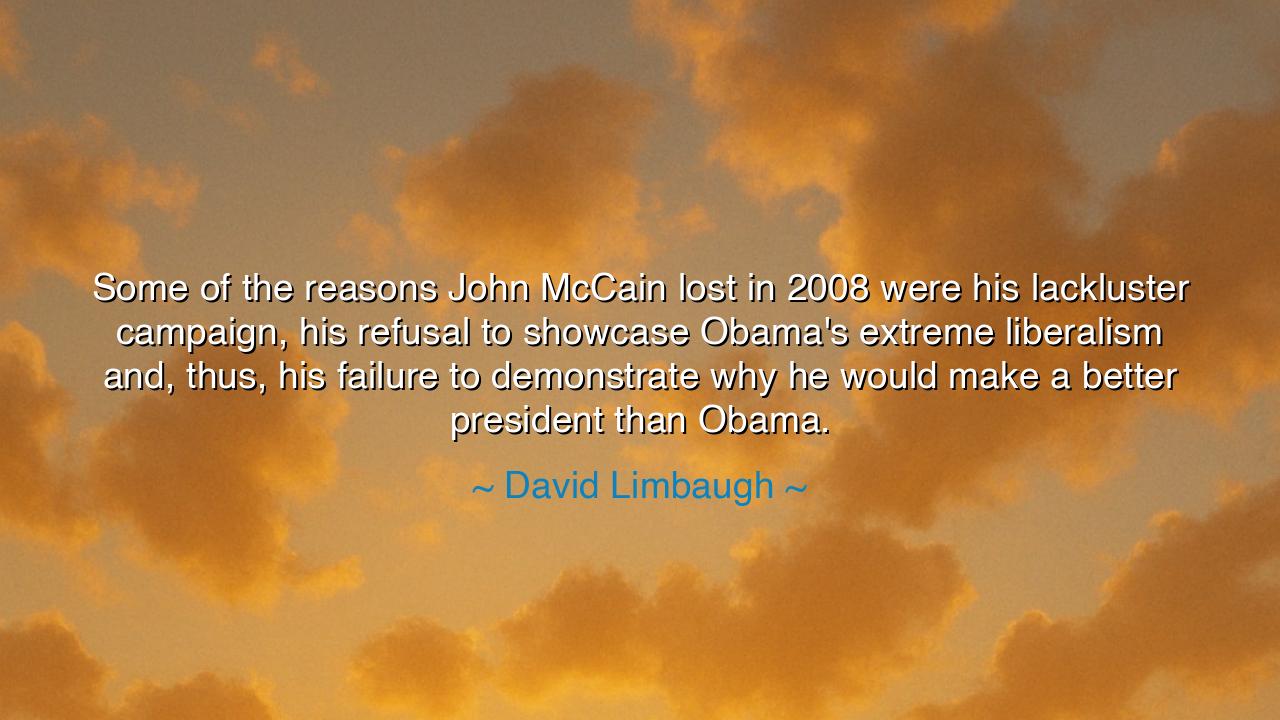
Some of the reasons John McCain lost in 2008 were his lackluster
Some of the reasons John McCain lost in 2008 were his lackluster campaign, his refusal to showcase Obama's extreme liberalism and, thus, his failure to demonstrate why he would make a better president than Obama.






The soft hum of the café filled the space, blending with the gentle tap of rain against the window. Jack sat across from Jeeny, his fingers loosely wrapped around his coffee cup, staring out at the rain-soaked street. Jeeny, sitting opposite him, appeared thoughtful, her eyes distant as she processed something in her mind.
Host: The stillness between them lingered for a moment, until Jeeny finally spoke, her voice calm but reflective.
Jeeny: “I came across a quote today by David Limbaugh that made me think about political strategy. He said, ‘Some of the reasons John McCain lost in 2008 were his lackluster campaign, his refusal to showcase Obama’s extreme liberalism and, thus, his failure to demonstrate why he would make a better president than Obama.’ Do you think that McCain’s campaign really fell short because of these reasons?”
Jack: He looked up, considering her question carefully. “I think it’s a valid point, especially when you look at the dynamics of the 2008 election. McCain had a tough time drawing clear distinctions between himself and Obama. McCain had his strengths—experience, a strong military background—but his campaign didn’t quite capitalize on that contrast in a way that resonated with voters. In some ways, it felt like a missed opportunity to make a more compelling argument for why he was the better choice.”
Jeeny: She nodded thoughtfully, her expression serious. “Exactly. Political campaigns are about more than just running on your strengths; they’re about creating a clear choice for voters. If you don’t demonstrate why you’re the better option, then it’s easy for voters to either stick with the status quo or take a chance on something new. Obama was able to create a strong, unified vision for change, while McCain didn’t manage to articulate his case in a way that felt fresh or convincing enough.”
Host: The soft sound of the rain outside deepened the quiet of their conversation. Jack paused for a moment, his fingers resting still on his cup as he thought further about McCain’s campaign.
Jack: “And it’s interesting, because McCain was someone who could have leveraged his experience—both as a war hero and a seasoned politician—to make a strong case for leadership. But instead, the campaign often felt like it was trying to play it safe, focusing on the need to stay above the fray rather than aggressively defining the contrasts. In that sense, he allowed Obama to shape the narrative without pushing back hard enough.”
Jeeny: “Yes, and that’s where a lot of campaigns fall short. Politics isn’t just about being the most qualified; it’s about being able to make voters understand why your qualifications matter. McCain had a great deal of experience, but his failure to clearly demonstrate how that experience made him the better choice compared to Obama’s fresh approach made it hard for many to see the distinction. If he had showcased Obama’s policies and ideology more directly, it might have helped voters understand why McCain’s vision would be better for the country.”
Host: The conversation between them deepened as the understanding of political strategy grew clearer. Jack set his cup down gently, a thoughtful expression on his face as he reflected on the broader implications of political campaigns.
Jack: “In the end, campaigns are about storytelling. It’s about making a narrative that people can latch onto, something they believe in. If you don’t clearly define why your approach is different and better, then voters are left to make a decision without the right context. And in 2008, Obama had a much clearer narrative, a story that appealed to the desire for change and unity. McCain’s message, on the other hand, seemed less focused.”
Jeeny: “Exactly. It’s not just about having a plan or being the most qualified; it’s about presenting that plan in a way that feels compelling and relevant to what people need at the moment. McCain’s campaign didn’t do enough to show why he would be the better leader, and without that, it was hard for voters to feel confident about him over Obama.”
Host: The rain outside had slowed to a gentle mist, but inside, Jack and Jeeny sat in the quiet realization that political campaigns are not just about credentials—they’re about creating a clear, compelling vision of leadership that resonates with voters. McCain’s failure to draw sharp distinctions and make a strong case for why he was the better choice ultimately allowed Obama’s vision of change to shine through.






AAdministratorAdministrator
Welcome, honored guests. Please leave a comment, we will respond soon